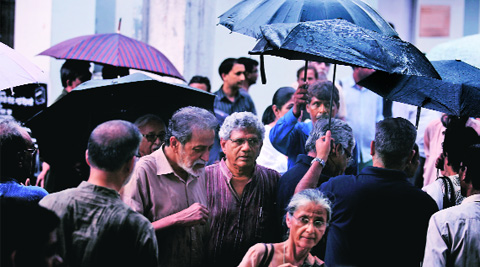Bipan Chandra: The man whose view of Modern India is inescapable
For him, past was a moral drama in more black-white than 50 shades of grey, says Pratap Bhanu Mehta.
CPM leader Sitaram Yechury with Chandra’s son at the cremation in New Delhi on Saturday. (Source: Express photo by Praveen Khanna)
It is a measure of Bipan Chandra’s achievement as a historian that he defined the mainstream establishment’s self understanding of Modern India for a very long time. Other historians have been more scholarly or more conceptually innovative. But few historians weaved together a narrative of Modern India in a way that had the power of becoming a default political common sense. Our understanding of Modern India has to, even when we disagree, come to terms with the framework he laid out. Most historians are remembered because they were gifted in some way. Chandra’s achievement was more elusive: he became inescapable.
His influence was a function of his extensive writing of textbooks and co-authoring of two best-selling synthetic accounts. It was also a function of his position in India’s premier history department at Jawaharlal Nehru University. I did not know him well personally, but read nearly everything he published. But by all accounts, his civility and commitment to teaching that was on display in our brief meetings was characteristic of the man.
Much of his work, ranging from the still useful monograph on Economic Nationalism to important books on Communalism, seemingly carried the imprimatur of history. But their success was very much rooted in the politics they articulated. The great International Relations scholar, Hedley Bull, once wrote that “inquiry has its own morality and is necessarily subversive of political institutions and movements of all kinds, good as well as bad.” But Chandra’s sensibility was in some ways the opposite: it was almost as if the task of the historian was to provide a usable narrative; it was a weapon to wield against political opponents, it was to produce a consensus around the common terms.
He was successful in articulating a usable political history, and then openly practicing history as ideology by other means. His assumptions are now so widespread that we forget what an achievement it was to make them hegemonic. One assumption, clearly articulated in Communalism in Modern India, was that while communal consciousness could exist in pre-Modern India, communalism could not. This is not the place to go into the veracity of this claim. But what is striking is that this conclusion is arrived at almost a priori. History is an elaboration of this claim, not evidence for it.
Chandra also managed to tie the project of political secularism to a historiography of secularism. It rested on a claim that the way we represent the past will bear on the way we think of the future: if the past turns to be the site of communalism, so will the future. It has less space for Hedley Bull’s thought that history might turn out to be subversive of all kinds of claims, good and bad. It had the consequence of making all history, political and all politics coterminous with a historical narrative. At one level it raised the stakes in historical inquiry; at another level it made genuine historical inquiry difficult. This is the legacy we are still coming to terms with.
The second assumption is that history as a moral drama is more black-white than 50 shades of grey. This was clearly on display in what was perhaps his most controversial book, In the Name of Democracy: J P Movement and the Emergency, a book that was a sophisticated apologia for Indira Gandhi’s authoritarian politics.
To simplify somewhat, in Chandra’s major works, modern Indian history is broadly on the trajectory of an inclusive passive revolution. But it is subverted by woolly headed political mobilisers like JP, especially when they give space for the RSS. In a sense, strangely for Marxists, history, rather than emerging as a product of a complicated economic, social and even cultural churn, ends up being a drama where forces of disorder need to be curbed in the name of something called a secular order. In some ways, Chandra’s world view captured that of the historical protagonist he subtly defended — Indira Gandhi: secular, economic nationalist but unable to fathom complex process as anything other than a conspiracy. The strange Congress-Left elective affinity was forged less by a fear of the RSS than by the fact that the Congress, during the ’70s, gave up its own complex historical sensibility and substituted it with the Left. Chandra was the key protagonist in that significant historical transformation and therefore dominated like few historians have.
His greatest triumph was to make this view of history so inescapable that even his opponents were forced to practice it. Animating this deep conflation of history and politics was perhaps an admirable ethical impulse: it was the fear that if the past did not tell a comforting story, the future will not as well. Even as we struggle to escape from the limitations of that framework, the questions Chandra asked about the relationship between politics and history will haunt us for a long time.
http://indianexpress.com/article/india/india-others/bipan-chandra-the-man-whose-view-of-modern-india-is-inescapable/2/

Nessun commento:
Posta un commento